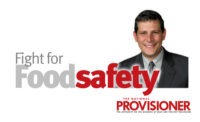Fight for Food Safety
Is your company’s insurance ‘recall-ready’?

If you think it is unlikely that your food products will someday be recalled, or that you’ll be covered by your insurance if it ever happens, think again. Recalls for the presence of pathogens or undeclared allergens in food products will continue to occur, notwithstanding best efforts to prevent them. And while many companies go to great lengths to protect their customers, they often fail to protect themselves.
Within this context, it is incredibly important to reassess the extent and scope of your existing insurance coverage. This is because many companies have coverage gaps in their insurance that do not become apparent until it’s too late. And, sometimes, the fine print buried deep within insurance policies will benefit the insurance company at the expense of the insured.
In particular, many food companies have been told by insurance brokers who have no real experience in the food industry that they have coverage under a commercial general liability (CGL) policy for certain contingencies, when coverage does not in fact exist. Alternatively, some companies have purchased recall and business interruption insurance only to discover later that the fine print actually excludes the specific problem they worried about most. For example, some policies only provide coverage for recalls if they are “government mandated,” when most recalls (if not all) are strictly voluntary.
To best protect themselves, all companies should assume that they will someday find themselves dealing with a food product recall. Because most CGL policies do not cover recall-related losses, such as direct recall costs, business interruption losses, and lost profit claims from suppliers, companies should carefully assess their need for separate recall, business interruption, or similar types of insurance. These types of policies are readily available, and premiums are becoming more affordable.
Thus, if your current insurance does not cover recalls, you should consider whether, and at what level, recall insurance is needed. There are many different types of insurance, however, and the scope of coverage can vary greatly. For this reason, you should carefully assess the types and levels of available coverage, as well as the insurance companies themselves, what those companies charge, and how those companies will respond when your business faces a crisis.
The risk for all food companies of being affected by a recall, either directly or indirectly, is substantial. If your company has not yet faced a recall, chances are that it will. It is far better to insure that you are recall ready before a recall happens, rather than waiting until it abruptly occurs. Taking a few steps today can and will pay substantial dividends when that day arrives
Looking for a reprint of this article?
From high-res PDFs to custom plaques, order your copy today!






